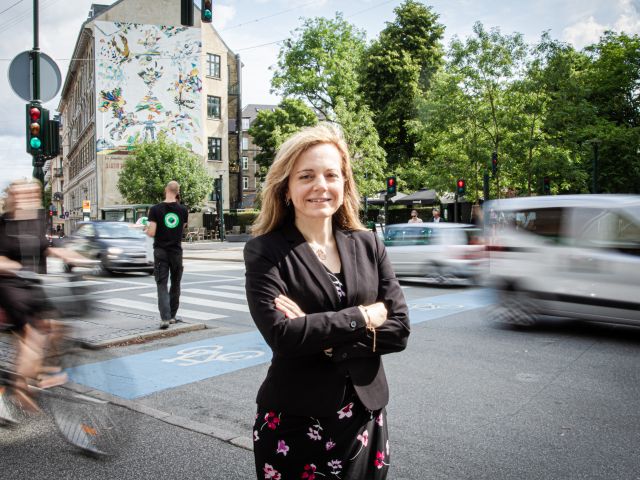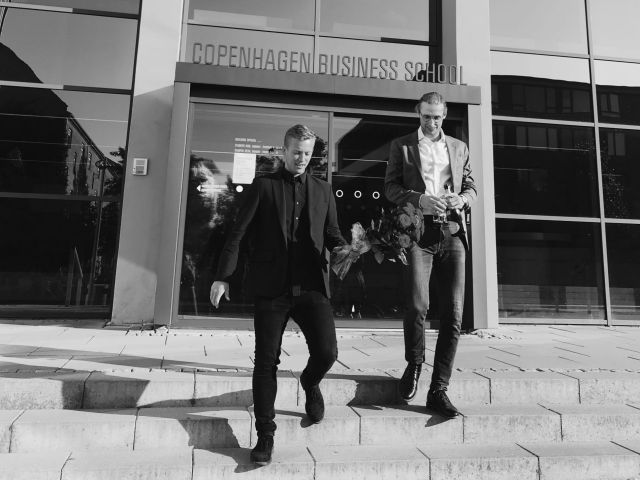CBS professor studies 5,400 parents for 15 years and notes fewer divorces if fathers take paternity leave

Does sharing paternity leave have an effect on divorce rates? Twi CBS researchers have followed 5,400 married couples in Iceland to find out. (Illustration: Shutterstock)
An Icelandic study by the Department of Economics at CBS shows that if fathers are granted earmarked paternity leave, the divorce rate decreases, the fathers are more likely to participate at home, and parents are less likely to fall into traditional gender roles.
For 15 years, Associate Professor at the Department of Economics at CBS, Herdís Steingrimsdottir, and Associate Professor at the Department of Finance at CBS, Arna Olafsson, observed 5,400 Icelandic married couples from the moment they had children onwards.
The study aimed to reveal whether more equal sharing of childcare could affect divorce rates.
In Iceland, both fathers and mothers each have three months of earmarked parental leave, while in Denmark, mothers have eighteen weeks and fathers have two.
As the Danish parental leave system is a recurring subject of discussion in the media and in political debates, according to Herdís Steingrimsdottir, the study was not only interesting for her as a scholar, but was also relevant in a Danish context.
From 0 to more than 80 percent
In the study, Herdís Steingrimsdottir and her co-researcher looked at what happened when Iceland introduced paternity leave. And in order to explain their findings, some historical background is needed.
Before 2001, parents were allowed six months of parental leave. And even though the system did offer some flexibility in the area, given that both fathers and mothers could share the parental leave period, women mostly took the whole six months themselves.
Then, the Icelandic government decided to expand the period by an additional three months, and also granted each parent three months of earmarked parental leave. This now meant that the parents were entitled to three months each with three subsequent months that the parents could divide up themselves.
All these initiatives were implemented step by step. But, as Herdís Steingrimsdottir explains, the changes affected how the parents chose to share the parental leave.
“Interestingly, this was very effective in Iceland. Before these changes, hardly any men took a share of the parental leave, but after the earmarked paternity leave was introduced, more than 80 percent of Icelandic fathers took advantage of the offer,” she says.
Decreasing divorce rate
Herdís Steingrimsdottir and her colleagues were fascinated to see that the share of men choosing to take paternity leave shot up from nearly 0 to more than 80 percent because of the governmental changes.
Next, the researchers wanted to know more about the effects of this new trend. More specifically, how would the parental leave changes impact on Icelandic parents’ marital stability?
“Therefore, we compared 5,400 married couples in total – half of them had children just before the changes, and the other half had children immediately after the changes.”
“So, the parents who had children in December 2000 would be unable to take advantage of the reforms, but those who had children born in January 2001 would come under the new rules,” Herdís Steingrimsdottir explains and continues:
“And actually, we found that marriages with fathers who took advantage of the new paternity leave reforms were less likely to end in divorce than marriages covered by the old rules,” she says and clarifies that in order to verify their conclusions they continued to keep an eye on the parents:
“We followed the two groups of parents for 15 years, and the pattern persisted. So that was very interesting,” she says.
We saw that this specific decrease in the divorce rate occurs for parents with similar levels of education or where mothers have higher levels of education
Herdís Steingrimsdottir
Herdís Steingrimsdottir elaborates that depending on the sample and controls included in the analysis, the decrease in the divorce rate among couples where the father took advantage of the paternity leave was, in fact, 8.9 percentage points.
In the group of parents who had no paternity leave, 40 percent were separated after 15 years. And the results indicate that paternity leave could have reduced this divorce rate to 30-35 percent.
Furthermore, after reaching this conclusion, the researchers became interested in investigating whether this tendency was similar for all married parents, or whether various types of couples differed.

For this, Herdís Steingrimsdottir and her colleagues observed couples where both the mothers and fathers shared the same level of education, couples where the mothers had higher levels of education and vice versa. And the results were quite clear.
“We saw that this specific decrease in the divorce rate occurs for parents with similar levels of education or where mothers have higher levels of education. Among couples where the fathers have higher levels of education, there’s very little effect,” says Herdís Steingrimsdottir.
Political debates
In Denmark, parents are granted 52 weeks’ parental leave in total. Mothers can choose to take at least 4 weeks of maternity leave before the birth. After giving birth, mothers are obliged to take two weeks’ maternity leave and can then opt to take an additional 12 weeks – a right that is reserved for mothers alone.
Within the first 14 weeks of their children’s birth, fathers have the right, but are not obliged, to take two weeks of paternity leave, and the remaining 32 weeks can be divided between both parents as they prefer.
This parental leave model makes Denmark stand out. At the same time, the model sparks recurring political debates.
This is exactly why Herdís Steingrimsdottir believes her research findings from the study on parental leave in Iceland are relevant in a Danish context.
“I believe our study is very pertinent in Denmark. There’s a constant debate about whether or not to implement paternity leave here like in other Nordic Countries. And although we still know very little about the effects of the different parental leave systems, I think our findings are useful in these discussions,” she says.
Equal in terms of the labor market, the household and parenthood
Apparently, the Danish parental leave system can have some economic consequences. But according to Herdís Steingrimsdottir, it can also have essential social effects. Especially when it comes to earmarked paternity leave for the fathers, and parents’ marital stability in this context.
Although the researchers were interested to note the lower divorce rate among Icelandic couples when fathers were granted paternity leave and the level of education was equal between the fathers and mothers, or where the mothers had higher education levels than the fathers, this came as no profound surprise.
“I wouldn’t say I was very surprised. From the psychology and sociology literature, we know that the risk of divorce rises when married couples have children,” Herdís Steingrimsdottir says and explains:
“Nowadays, men and women are often expected to undertake similar roles and are equal in most senses. But in reality, when people have children, they seem to revert to traditional gender roles. And that can be quite problematic for some marriages,” she says and concludes:
“So to me it makes sense that the earmarked paternity leave seems to prevent couples from adopting the traditional gender roles by sharing the parental leave more equally. In particular, for parents who consider themselves equal in terms of labor market participation and taking care of the children.”
We can see that couples who are granted paternity leave seem to maintain the equality in how they divide their time between the labor market and tasks at home
Herdís Steingrimsdottir
According to Herdís Steingrimsdottir, the earmarked paternity leave may not only alleviate the trend of mothers and fathers falling into traditional gender roles and safe marriages. It can also have an effect on the households and parenthood.
“Different couples have different preferences, so this is not necessarily true for all. But on average, it seems that paternity leave has a positive effect for the couples,” she says and elaborates:
“We can see that couples who are granted paternity leave seem to maintain the equality in how they divide their time between the labor market and tasks at home. And other studies show that even after the paternity leave finishes, the fathers do more housework and are more likely to stay at home if the children are ill.”
“So it seems to have a long-term impact on the division of labor at home,” Herdís Steingrimsdottir concludes.







































































































































Comments